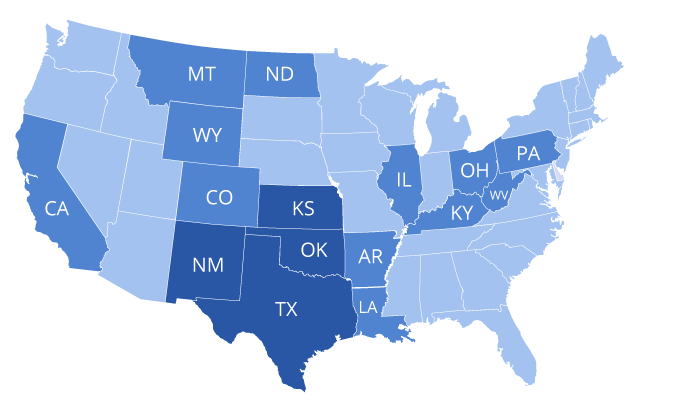Mineral Rights Under a Solar Farm
Solar developers often purchase mineral rights under a potential solar development.
Sell Your Mineral Rights (Request an Offer):
Start with the Basics
Why Do Solar Farms Buy Mineral Rights?
Mineral owners are often surprised when a solar development company offers to purchase their mineral rights. Sometimes the mineral owner didn’t even know they owned the mineral rights!
With the expansion of solar farms, this situation is becoming more and more common.
Basic Primer on Mineral Rights
All property starts off as “fee simple” property (ownership of the surface and the minerals). When oil and gas were discovered, it became popular to sever the mineral rights from the surface, creating two separate estates with two chains of title.
So, How Does This Impact Solar Developers?
In many states, the mineral estate is dominant, giving the mineral owner the right to use as much of the surface as necessary to develop the minerals.
This could be a nightmare for a solar farm. Just imagine spending millions of dollars to build a solar power plant only to have an oil or gas well drilled in the middle of the property! Not only does this necessitate the removal of some panels, but the well equipment will likely cast shadows, potentially reducing the production for the entire solar power plant.
To eliminate this issue, solar developers will often attempt to purchase the mineral rights under any property where they plan to install solar panels. In fact, they will often purchase the mineral rights to adjacent properties to avoid the chance that a shadow will be cast across their panels.
Similarly, wind developers will sometimes buy the mineral rights under their wind farms. Interestingly, Wind royalties are similar to oil and gas royalties.


Valuation 101
What Are Mineral Rights Worth?
Mineral rights are “real property,” and like any real estate, location is everything. Many factors determine the value of mineral rights, but minerals outside of oil and gas fields and shale basins probably have very little value.
If your mineral rights are not located in oil and gas states, they may not have much value.
But that’s not always the case, and you don’t have to sell your mineral rights to the solar developer. You can see them to anyone (including us)! Or choose not to sell them at all.
You Have Options
What if I Don’t Like Their Offer?
If you own all or a majority of the mineral rights, the company may not be able to proceed with solar farm development if you refuse to sell.
However, if you only own a fraction of the mineral rights, and the developer purchases enough of the rights from other owners, the solar farm can be installed even if you don’t sell your mineral rights!
The greater percentage of mineral rights you own, the more leverage you have.
Your most powerful negotiating tool may be letting the solar company know that they aren’t the only game in town.
It would be a bit risky for us to buy your mineral rights – particularly if they are in states where there is very little oil and gas development. However, we are willing to do some research and potentially make you an offer.

Nationally Focused
Where We Buy Mineral Rights
We buy both producing and non-producing minerals in all oil and gas states. However, we are especially interested in Texas and Kansas mineral rights.
|
We even buy minerals in more obscure states, which produce very little oil and gas compared to other states.

Top Valuation Factors
How We Value Mineral Rights
There are many factors that play into the value of mineral rights. These include location, producing vs. non-producing properties, current oil and gas prices, well production figures, lease terms, and even the operator of the well or wells. We also look at the risks of buying and owning minerals that you are interested in selling.
Location
Minerals in the hottest shale plays are more valuable than those in older fields with conventional wells.
Producing vs. Non-Producing
Producing minerals are often worth more than non-producing minerals because they are generating revenue.
Oil & Gas Prices
When oil and gas prices drop, revenue drops, and sometimes operators are unable to continue operating the well.
Production
Highly productive wells (and off-set wells) can increase the value of your minerals.
Lease Terms
Favorable lease terms (such as a 25% royalty reservation) positively impact the value of the leased minerals.
Operator
A small number of operators are unethical, and their reputation automatically devalues your minerals.
Why Sell?
Why People Sell Their Mineral Rights
I am putting my affairs in order. I don’t want to burden my kids with the hassle of transferring ownership and managing small mineral rights. When my sister passed away, my niece and nephew had to hire an attorney to help them with the minerals. I don’t want my kids to go through that.
I inherited my mineral rights so they were sentimental, but I don’t really want to bother with managing them and filing extra tax returns. I decided to sell and use the money as a down payment on my house.
I had no idea how fast the oil production would decline. My checks are only 20% of what they were a few years ago. I should have sold my mineral rights when the wells were brand new and still generating huge royalties.
My oil wells have been producing for decades and the reserves are almost depleted. Once the wells are plugged, the value will be significantly lower. I’d rather cash out now.
I inherited mineral rights, but don’t want to be involved with fracking and fossil fuels. I would prefer to support renewable energy and do my part to reverse climate change.
